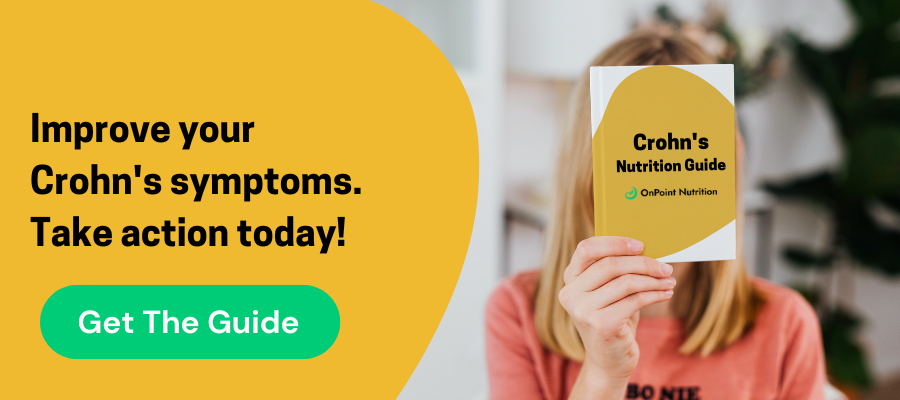
Crohn’s Disease is an Inflammatory Bowel Disease that causes inflammation throughout the gastrointestinal tract. There are two stages of Crohn’s Disease: active flare and remission. During an active flare, symptoms such as frequent or urgent bowel movements, diarrhea, bloody stool, abdominal pain, nausea, and vomiting are common. The goal when treating Crohn’s Disease is to achieve and maintain remission, which can be accomplished using a variety of treatment methods.
Probiotics are live microorganisms that can help to balance the microbiome in your gut. The bacteria contained in probiotics are commonly referred to as “good” bacteria. These bacteria live in the gut and support overall health. More specifically, these beneficial bacteria support digestion and immunity.
Probiotics are found in foods such as yogurt, kefir, sauerkraut, kimchi, miso, tempeh, kombucha, and other fermented foods. Supplements containing various strains of probiotics are also widely available. Consuming more beneficial bacteria by eating fermented food and/or taking probiotic supplements is thought to positively impact both the digestive and immune systems.
Probiotics and Crohn’s Disease
Individuals with Crohn’s Disease often have an imbalance of gut bacteria. More specifically, most have fewer beneficial, anti-inflammatory bacteria than individuals without any form of IBD. It seems logical that using probiotics can restore the bacterial balance in those with Crohn’s Disease. However, the answer isn’t quite that simple. Experts are still not sure how directly probiotics affect Crohn’s Disease symptoms.
Potential Pros of Using Probiotics for Crohn’s Disease
Some experts believe that probiotics can help restore the “good” bacteria imbalance in microbiome, which can help to subdue the immune response in the gut and reduce Crohn’s Disease symptoms. These experts maintain that adding probiotics reduces intestinal inflammation, which alleviates frequent symptoms such as diarrhea and upset stomach.
However, although some scientists believe that probiotics can help, very little research has been done to establish a direct link between probiotic consumption and improved Crohn’s Disease symptoms. The research that does exist has only been conducted on a very small number of people. Consequently, it is hard to generalize these results to everyone who suffers from Crohn’s Disease. One of these small studies showed improvements in the barrier function of the intestine and an increase in anti-inflammatory compounds in the gastrointestinal tract. These findings led the researchers to conclude that probiotics are “promising” as a treatment for Crohn’s Disease.
A review of existing research on probiotic supplementation for Crohn’s Disease concluded that more research is necessary to establish a link between cause and effect.
Potential Cons of Using Probiotics for Crohn’s Disease
As with any medication or supplement, we recommend talking to your doctor and dietitian if you are considering taking a probiotic supplement for Crohn’s Disease. One key risk factor is that the live bacteria found in probiotics may increase the risk of infection in individuals with a compromised immune system. More specifically, individuals taking steroids, immunosuppressants, or a combination of multiple medications should specifically speak with their doctor about the pros and cons of supplementing with probiotics.
Another potential issue with probiotic supplementation is the general risk of mild side effects that come with probiotic supplementation. These side effects include upset stomach and gas. If you have Crohn’s Disease, probiotics could actually trigger the upset stomach and gas that you are trying to correct!
The Bottom Line
At this point in time, there is no clear link between supplementing with probiotics and experiencing relief from Crohn’s Disease symptoms. Until we better understand the connection, it is best to speak with your doctor before making any changes to your diet or supplements.
If you are curious about adding probiotics into your diet, taking a food first approach is likely a good place to start. If you are not allergic to probiotic-containing foods, slowly incorporate a few of them into your diet. If you decide to take this approach, keep a food and symptom log. Your doctor and dietitian can then evaluate the effectiveness of the probiotics you are adding to your diet.
Be sure to note what you are eating and what symptoms you are experiencing to build a clear picture of any changes that the probiotics may be associated with. However, it is still important to note that research has not proven that probiotic foods can alleviate symptoms of Crohn’s Disease.
If you’re having trouble managing Crohn’s Disease symptoms and looking for solutions, we are here to help. We recommend working with a dietitian who can help you achieve and maintain remission.
Learn more about our approach to Crohn’s Disease here.

Topics

Kaitlyn Willwerth is a Registered Dietitian at OnPoint Nutrition. Kaitlyn's work focuses on providing individualized health and lifestyle coaching and, most importantly, support. She is a Certified LEAP Therapist and has also completed the Monash University 'Low FODMAP Diet for IBS' online training course for health professionals.




